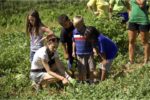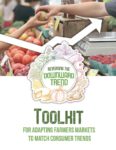The educational materials listed on this page are about Local and Regional Food Systems.
Local and regional food systems are ones that produce and distribute foods on a local scale rather than a national or international one. Food goes from farmer to table in fewer steps, by means of CSAs (Community-Supported Agriculture), local farmers’ markets, cooperatives, local food hubs or through commercial or institutional buyers, including schools, hospitals, grocery stores and restaurants. The goals of local food systems are improving the economic wellness of communities, increasing avenues to fresh local foods and creating viable markets for farmers and ranchers through value based supply chains and rural/urban integration. Local food systems also help sustainable communities prosper by strengthening the economic resilience of farmers and ranchers, via partnerships and social networks. Local farmers’ cooperatives provide farmers with the resources and scale of production needed to help each other tap lucrative value added food processing opportunities. Community supported agriculture, and farmers co-ops also help beginning farmers have a place to start through the support of the community.
More information on local food systems, including tips for land access, a topic of particular interest to beginning farmers, can be found in the topic brief Building Local and Regional Food Systems. This topic brief is an online collection of practical resources on business and marketing planning, distribution and aggregation, meat processing and food processing, and more. For example, find resources for people who want to build poultry processing facilities or explore small-scale meat packing. The guide Building a Sustainable Business can be of service to beginning farmers, with its approaches to starting a successful farming business in a local food system and writing business plans and marketing plans.
Showing 1-3 of 3 results

Vermont Food Education Every Day
Includes guides for farmers and food service personnel working to increase local food in schools.

Reversing the Downward Trend
Farmers across the Northeast have reported decreases in consumer participation at farmers' markets and reduced sales. This toolkit was developed as a result of survey research that looked at consumer perceptions of shopping at farmers' markets. The publication provides information on marketing strategies and services aimed to help farmers' market managers and farmers understand what […]
Assessing the Economic Impacts of Regional Food Hubs: the Case of Regional Access
This report assesses the economic impact of food hubs on the distribution and sale of local foods.